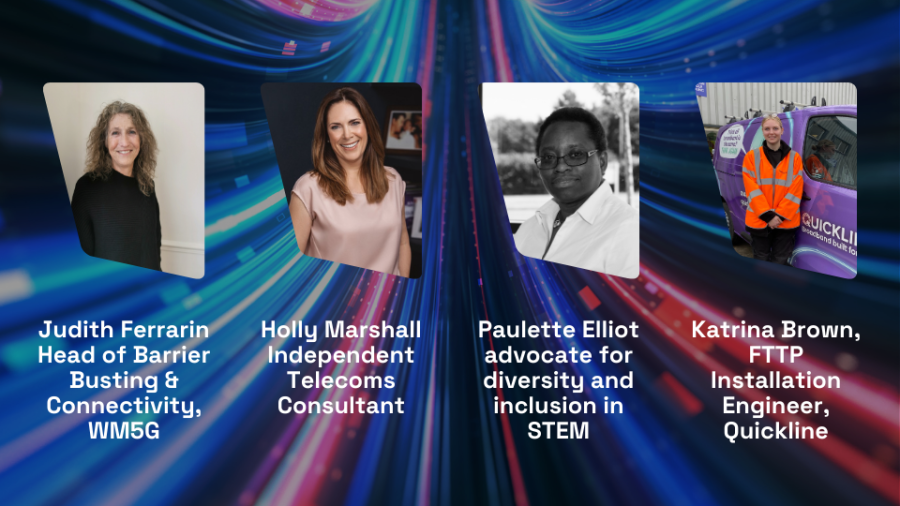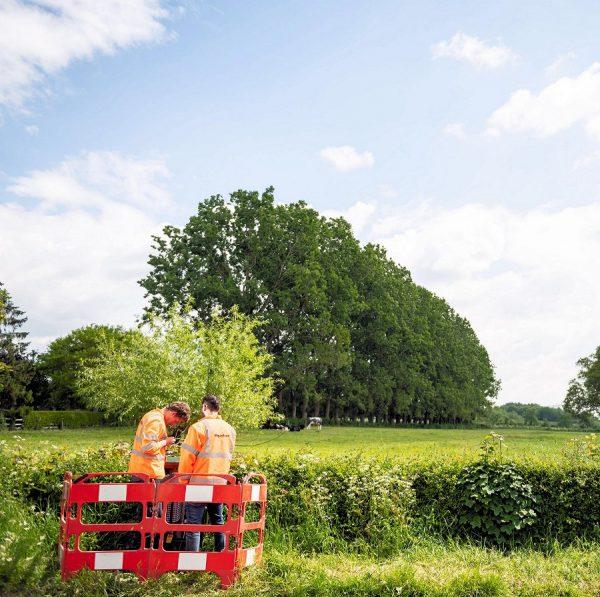
The connectivity and telecoms sector has a diversity problem: only 12% of its engineers are women. UKTIN Talent - led by WM5G - aims to address this, within a national programme of activity designed to raise awareness and encourage education leavers, career returners and switchers to consider a career in the industry.

As a part of International Women in Engineering Day 2024, we spoke to four female engineers working in telecoms at different stages of their careers: Judith Ferrarin, Head of Barrier Busting and Connectivity at WM5G who has been within telecoms since graduating from a BT engineering apprentice scheme and worked within the areas of external civils implementation and the mobile telecoms environment; Holly Marshall, Independent technology consultant specialising in Telecoms, Position, Navigation and Timing, Signal Simulation, 5G and LEO Comms; Paulette Elliot, a passionate advocate for diversity and inclusion in STEM, with 30+ years’ experience in telecoms and IT service management; and Katrina Brown, an FTTP Installation Engineer at Quickline who goes out to the homes of new customers to install their broadband.
1/ What do you enjoy most about being an engineer in telecoms?
Ferrarin: As a telecoms engineer, I have had many opportunities within the industry to learn, and grow my technical and soft skills. I was given the opportunity to work within programme; project and contract management, as well as planning of telecoms networks. I have particularly enjoyed two aspects of my engineering career: firstly, the supervision of the implementation of fibre and infrastructure within a civils engineering role, which gave me my initial steps of working autonomously and taking on responsibility for time critical projects. The second was the management of the mobile industry “mobile” fleet for EE. This role included the temporary acquisition of land for increased coverage and capacity for events such as Glastonbury, major music festivals and State events.
Marshall: The opportunity to solve complex challenges and make a real difference in how people connect and communicate. It also offers such a diverse set of interesting work opportunities from driving the evolution of autonomous vehicles and delivering next generation spectator experiences at the Olympics, to looking at new, lighter materials for lattice towers, or delivering faster comms into airplanes from low earth orbit…The Telecoms ecosystem moves at such a fast pace: I am constantly learning, get to work with really clever people and am never bored.
Elliott: I started my engineering career in telecoms in 1994 and have had an amazing number of years working on projects which at the time were innovative and emerging, and have since had societal and economic impact. Key career highlights include being part of a joint venture project to implement and trial a ‘‘tele-/remote-working’ pilot programme all the way back in 1994 through to working on various public/private co-funded collaborative R&D projects delivering emerging and enabling technology (for connected vehicles and Internet of Things) products and services using terrestrial and satellite communications for data connectivity.
Brown: I love learning new things and that’s something I get a lot of working as a fibre installation engineer. I started at Quickline with no experience whatsoever in engineering. I knew it was going to be totally different from anything I had done before; that was what I liked about it. I was fully signed off within three months of starting and I can now do installs on my own, I can use drills, climb poles, splice. I’ve got qualifications for underground safety, underground cabling. I’m really proud of myself.
2/ Why is your work important?
Ferrarin: The role of an engineer is a vital part of a bigger picture of implementation. As an engineer you can influence change in design and methodologies. The engineering role is the golden thread throughout all aspects of a telecoms project, and, as such, the engineer becomes involved in a complete workstream, not just a single function. The role of an engineer is diverse, ranging from an advisory position providing guidance through to change management and ensuring best practice is observed.
Marshall: Telecoms is critical national infrastructure. It forms the backbone of communication, enabling everything from simple phone calls to advanced data services. Reliable telecoms networks support emergency services, businesses, education, and personal connections, driving economic growth and societal development. In a connected world, ensuring robust and efficient communication systems is essential – it feels good to be part of something which is so fundamental to a smooth-running society. I’m also pretty happy that I work on something which allows me to video call my family in Spain from a bench by the river Thames!
Brown: At Quickline we specialise in connecting rural customers and so some of the people I go out to connect have previously had poor internet speeds. Installing fast, reliable internet makes so much difference to those people, giving them access to online activities that most of us just take for granted.
3/ What’s the one thing you’d like people outside the sector to understand about telecoms?
Ferrarin: Telecoms is a vast sector. It has many different roles within many different organisations. You are not limited because it covers so much more than you would think. It is a part of project management and includes network architecture and planning all the way through to the physical implementation of equipment.
Marshall: Just how much goes on behind the scenes to keep people and things connected. From the engineering that ensures reliable signals, to the constant innovation that drives faster and more secure networks, there's a lot of hard work and creativity involved in making sure people can bank online, that hospitals are kept connected, that we know the time and that we can receive deliveries. Not to mention my personal daily addition to Wordle!
Elliott: A career in telecoms has so much to offer. It is not just about climbing a telegraph pole to fiddle with cables, there is so much more. I have worked on projects linked to telecoms across the globe, and through these different job roles, the skills and experience I have gained are numerous.
Brown: I don’t think everyone appreciates the crucial role telecoms plays in connecting the world and driving innovation. It is not just about making phone calls, posting on social media and accessing the internet; it’s a key part of society today. Telecoms is central to modern life, enabling progress and connectivity. There are so many roles within the sector and such a lot of opportunities, now and in the future. It is an exciting place to work and I think it will get even more interesting as technology develops.
4/ Do you have any advice for women hoping to move into telecoms?
Ferrarin: I joined BT as an engineer apprentice before women in engineering was a normalised and accepted practice. At that time there were four female engineer apprentices within the region! I’m pleased to say things have changed a lot since then. I’d encourage women to be bold. Do not have preconceived ideas. Telecoms is a thriving industry that has many opportunities, and once you are a telecoms engineer you will gain valuable transferable skill sets.
Marshall: Go for it with the confidence that there is a genuine need for more women. We bring different skills and insights which can help increase the pace of innovation – and that is rewarding. The industry also tends to offer a lot of flexibility – which can be great for work/life balance and the work is genuinely interesting and diverse (especially if you consider space-based networks too). We are also a friendly, supportive bunch - mentors and networks that can support you on your telco journey are easy to find and engage with. What’s not to like?!
Elliott: Go for it. There are so many roles for women in telecoms, and don’t be put off thinking it is a boring industry. My career achievements are proof that a move into telecoms is far from boring.
Brown: If you really want to do it, you can! My stepmum was an engineer for a few years and is now a network planner for Quickline. When I was younger, I would ask her about what she did and found it really interesting. So, when I saw the job come up with Quickline I thought it was a great opportunity to try something completely new.
I’d definitely like there to be more women in the job and I hope more women will join the industry over the years and do this sort of thing. Anyone can learn the skills and I would encourage them to give it a try.
We’re looking for Telecoms Ambassadors - people who can tell their own stories about what working in telecoms and the connectivity space entails. Keen to find out more? Email [email protected].









